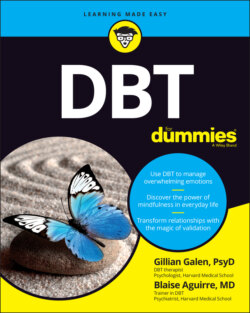Читать книгу DBT For Dummies - Gillian Galen - Страница 41
Searching for multiple truths in any situation
ОглавлениеThe core dialectic in DBT is that acceptance and change coexist. This is best illustrated by an example. Imagine that you’re stuck in very heavy traffic. You can’t get out of the car, there are no nearby exits, and your mobile app tells you that you’re at least an hour away from a meeting that you should have been at 30 minutes ago. What can you do? For some people, there could be rage, for others resignation, and for others an attempt to solve the problem a different way, like calling in to the meeting. The reality of that moment requires the acceptance that the moment is as it is.
So, if there is acceptance of the moment, where does change come into the picture? Because a traffic jam can be so aggravating, it can lead to persistent suffering. Another way to consider it is to say, “I cannot make the traffic be anything other than what it is, but I can change my reaction to the heavy traffic. I can learn to relax when I am in intolerable situations.” Imagine that your identical twin was traveling in the car next to you and you were both in the same traffic. Imagine that you were not accepting reality and fighting it all the way, feeling that it was unfair that the traffic was so bad. What would your state of mind be? On the other hand, if your twin were practicing to see that change coexists in the moment and that the one thing that they can control is their state of mind and their reaction to the stressful situation, they would be in a far more relaxed state of mind. What research shows is that the more emotionally regulated a person is, the more capable they are of solving problems, and that the more dysregulated a person is, the fewer options come to mind.
From a philosophical perspective, we have the thesis on one side and an antithesis on the other side. Then comes what Dr. Linehan termed the dialectical synthesis, which is the integration of the two perspectives: “I can be in a situation that I don’t like and yet accept it, and by doing so, I can make the changes necessary to be more effective. As a result, difficult moments are opportunities for me to learn to be more capable and skillful.” For example, a thesis might be “I can’t bear being stuck in traffic.” The antithesis to this is “I can bear being stuck in traffic.” The synthesis is finding a way to bear the unbearable by finding a different route, changing the reaction to the problem of being stuck in traffic, or learning to accept being stuck in traffic.
